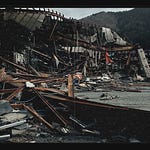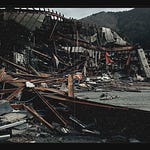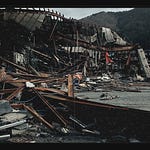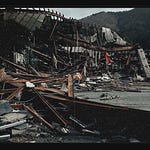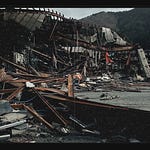Train Derailment Palestine, Ohio
Unless you live under a rock, you are aware of the devastating train derailment in Palestine, Ohio, leaving several injured and causing major damage to the surrounding area.
The incident has raised concerns about the effectiveness of emergency management procedures, as many have pointed to miscommunication and a lack of response from authorities as contributing factors to the severity of the incident.
The derailment occurred when a freight train carrying hazardous materials derailed on a curved section of track, causing multiple cars to overturn and spill their contents. The resulting chemical spill led to nearby residents' evacuation and several significant roads closure. Several people were injured in the incident, including first responders exposed to the hazardous materials.
In the aftermath of the derailment, many residents and local officials have expressed frustration with the emergency response. Some have accused emergency management officials of failing to adequately communicate the severity of the incident to residents, leading many to stay in their homes despite the danger posed by the chemical spill.
Others have criticized emergency personnel's response time, citing delays in the deployment of resources and a lack of coordination between different agencies. Many have also pointed to a need for more communication between different levels of government, with local officials claiming they needed to be given adequate information from state or federal agencies.
The incident has also raised questions about the effectiveness of emergency management plans in dealing with hazardous materials spills. Some experts have suggested that the response to the Palestine derailment was hindered by a lack of specialized training and equipment for dealing with hazardous materials.
In response to the criticism, officials from the Ohio Emergency Management Agency have defended their actions, citing the complex nature of the incident and the challenges of coordinating a response with multiple agencies. They have also emphasized the need for continued investment in emergency management training and resources to improve response times and communication.
Despite these efforts, the incident in Palestine is a stark reminder of the importance of effective emergency management procedures. As communities continue to face the threat of natural disasters, terrorist attacks, and other crises, emergency management officials must be equipped with the resources and training necessary to respond quickly and effectively to protect the lives and safety of residents.
In the aftermath of the train derailment in Palestine, Ohio, many have criticized the lack of federal government response, particularly the perceived inaction of the Federal Emergency Management Agency (FEMA). Despite the severity of the incident and the need for coordinated response efforts, some have claimed that FEMA has been slow to mobilize and provide assistance to affected communities.
The lack of federal response has been particularly concerning, given the scale of the disaster and the potential for long-term environmental damage. The train that derailed was carrying hazardous materials, including chemicals used in the production of plastics and synthetic rubber. When these chemicals spilled from the damaged rail cars, they contaminated nearby water sources and soil, posing a significant threat to the health and safety of residents in the area.
Despite these dangers, many local officials and residents have claimed that FEMA and the Biden Administration have been slow to respond and provide resources to help mitigate the damage. Some reports have pointed to a need for more communication between federal and local agencies, with little information being provided to local officials about the availability of federal resources or the timeline for their deployment.
In addition to concerns about the lack of response, some have criticized the overall readiness of FEMA to respond to disasters. The agency has been criticized for handling major disasters, including Hurricane Katrina and Hurricane Maria. Many have called for increased investment in emergency preparedness and response resources to equip the agency better to handle future disasters.
In response to these criticisms, FEMA officials have stated that they are working closely with state and local officials to provide support and resources as quickly as possible. The agency has also emphasized the need for a coordinated, multi-agency response to the incident, citing the complex nature of the disaster and the need for specialized expertise and equipment to deal with hazardous materials.
Despite these assurances, the lack of federal response to the train derailment in Palestine has underscored the need for improved coordination and communication between federal and local agencies in the face of disasters. As communities continue to face the threat of natural disasters and other crises, all levels of government must be equipped with the resources and expertise necessary to respond quickly and effectively to protect the safety and well-being of all residents.
Quick Links
MSNBC: Opinion By Samantha Montano
NY Times: After the Ohio Train Derailment: Evacuations, Toxic Chemicals and Water Worries
NY Post: FEMA sends help to East Palestine, Ohio 2 weeks after toxic train disaster
ABC News: Political fallout over federal response to Ohio train derailment
Yahoo News: Cincinnati stops using Ohio River water 'out of an abundance of caution' following East Palestine train disaster
Sponsors






